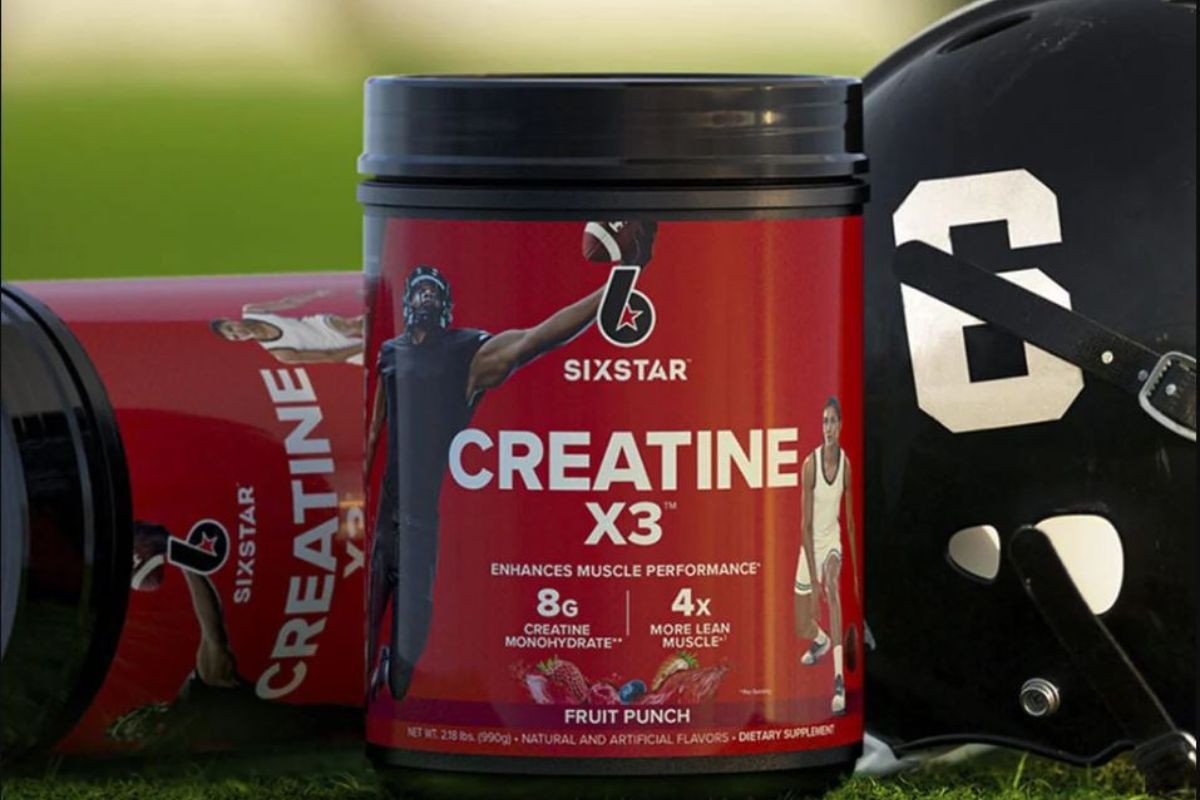Creatine is a natural compound our bodies make, and it's also found in some foods. It plays a key role in helping our muscles produce quick energy during activities like lifting weights or sprinting. Think of it like a fast energy booster stored in our muscles.
Our muscles store creatine in a form called phosphocreatine. When we do something intense, like a quick sprint, this stored creatine gives a little energy boost by helping regenerate ATP, which is like our body's energy currency. So, in simple terms, creatine helps us have the energy we need for short bursts of powerful movements.
Also Read: Is Creatine Good for Runners?
Creatine is a popular supplement in sports because it helps boost performance during activities that need quick bursts of energy, like weightlifting or sprinting. Scientific studies consistently show that using creatine can improve strength and your all around exercise performance. It works by increasing the body's energy storage, so muscles can recover faster between intense efforts.
One cool thing about creatine is that it can make muscles look fuller because it helps them retain water. This might lead to a bit of weight gain initially, but over time, it often means more muscle mass. And it's not just about muscles – research suggests that creatine might have benefits for the brain too, potentially helping with cognitive health.
So, in simple terms, creatine is like a helper for your muscles, giving you more power for quick and intense activities. It's backed by science, making it a popular choice for athletes looking to boost their performance. When we talk about creatine powder versus creatine pill, understanding how creatine helps your body to produce quick energy gives you a good starting point to figure out which form might work best for you, so let's explore more through this blog.
Table of content
Forms of Creatine: Powder and Pill
Let's start by looking thoroughly into each aspect of creatine powder and creatine pills, considering differences in composition and manufacturing.
What is Creatine Powder?
Creatine powder is basically creatine in a finely ground form. This type of creatine supplement is often marketed as creatine monohydrate, which is the most researched and widely used form of creatine. The powder is versatile, allowing you to adjust your dosage easily.
Many athletes and fitness enthusiasts prefer mixing it with liquids like water, juice, or shakes, giving you a customizable and often more varied option for consuming. Some creatine powders may also come in flavored varieties, to fit different taste preferences among people. SixStar, which is Americas #1 selling creatine brand has Fruit Punch Creatine X3 if you are looking for a fun way to supplement your creatine intake. The convenience of adjusting serving sizes makes creatine powder a popular choice among sportsmen who want a personalized approach to their supplementation.
What are Creatine Pills?
Creatine pills, also known as creatine capsules or tablets, give a more straightforward method of supplementation. Each pill contains a pre-measured amount of creatine in the form of creatine monohydrate. This eliminates the need for you to measure the creatine yourself before consuming, offering a convenient and portable option. But yes, one important thing to note is that these creatine pills might contain additional ingredients to hold the pill together, such as binders, fillers, or coatings. Although these additives are generally safe, they also contribute to the entire composition of the supplement.
What is the difference between Creatine Powder and Pill?
In terms of composition, creatine powder usually consists of pure creatine monohydrate, providing a high concentration of creatine per serving. The simplicity of the ingredient list will appeal to you if you are seeking a straightforward creatine source without other components. On the other hand, creatine pills may include a mix of creatine monohydrate and various additives to maintain the pill's structure. You should be mindful of these additional ingredients, especially if you have specific dietary considerations or preferences.
The manufacturing processes for creatine powder and pills also differ. Creatine powder is produced through a very straightforward process of drying and grinding creatine into a fine powder. This simplicity might be the main reason for the cost-effectiveness of creatine powder supplements. Creatine pills involve a more complex manufacturing process. The creatine must be compressed into a solid form, often requiring more steps and equipment. This process impacts the density and dissolution characteristics of the pills, also affecting how quickly the creatine is absorbed by the body.
How Do They Work? Creatine Powder vs Pill
Let's talk about how our bodies soak up and use creatine from powders and pills. When you go for creatine powder, it's like a quick entry ticket. Once you mix it with water or your favorite drink, your body gets to absorb it rapidly. The fine powder form allows for faster dissolution, making the creatine readily available for your muscles.
On the other side, creatine pills take a bit longer to do their work. The pill must break down in your stomach before your body can start absorbing the creatine. This means the process might be a tad slower compared to the speedy absorption of creatine powder.
The bioavailability story doesn't end there. Some studies suggest that the liquid form of creatine, like what you get with the powder, might be absorbed a bit more efficiently than the solid form found in pills. This is because liquids generally get processed faster in the stomach.
However, it's important for you to note that both creatine powder and pills eventually get the job done—they deliver creatine to your muscles to help with energy and performance. It's just a matter of whether you prefer the quick entry of the powder or the convenience of popping a pill.
Also Read: Creatine Before or After a Workout - What is Ideal?
Convenience and Portability: Creatine Powder vs Pill
When you break down the convenience of creatine powder and pills – it's more like comparing the speed of a sports car to the ease of a reliable sedan.
Creatine Powder
The pros: It's super easy to adjust your dose, and you can mix it with almost anything. However, the cons might pop up if you're on the go – measuring out powder isn't as quick as grabbing a pre-set pill.
Creatine Pills
Now, think of creatine pills as the reliable sedan. Convenient? Absolutely! Just pop a pill, and you're done. No measuring or mixing needed. But, if you're the kind of person who's always rushing, the time it takes for the pill to break down in your stomach might be a small consideration.
Now, for those juggling a busy schedule – both have their perks. Creatine powder offers flexibility but might require a bit of prep, while creatine pills are like the grab-and-go option, perfect for those constant movers and shakers. It all boils down to what suits your lifestyle – whether you prefer the flexibility of creatine powder or the straightforward ease of creatine pills.
Also Read: How to Load Creatine? The Ultimate Guide!
Dosage and Accuracy: Comparing Powder and Pill
Let's move onto dosage and accuracy to make sure that you'll be getting the right amount of creatine.
With Creatine powder, it is like having a measuring spoon – you can easily scoop out the exact amount you want. It's flexible, letting you adjust your dosage according to your need. On the other side, creatine pills are like pre-packaged snacks – the dose is set. Each pill comes with a specific amount, so there's no measuring involved.
But why is accurate dosing important? Why does it matter? Well, to understand this, try thinking of creatine as your source for muscle energy. Getting the right dose ensures your muscles have enough fuel for those intense bursts during any physical activity or workouts. Too little, and you might miss out on some benefits. Too much, and, well, it's like pouring too much water in a glass – not exactly a great idea. Accurate dosing is like following the rules– it ensures you get the best results without any surprises. Whatever your pick, hitting that sweet spot in dosage is key for making the most of creatine's performance perks.
Also Read: Can I Mix Creatine With Pre Workout?
Cost Analysis: Creatine Powder Vs Pill
While comparing the two, let's investigate the dollars and cents of creatine powder versus creatine pills – think of it as comparing prices at the grocery store to make sure you get the best deal.
When you're dealing with creatine powder, it's like buying in bulk. You usually get a larger quantity for a decent price. The advantage here is that the cost per serving tends to be lower compared to creatine pills. It's like getting more servings for your money. On the flip side, creatine pills can be a bit pricier per serving. Each pill has a set amount of creatine, and that convenience might come with a slightly higher price tag.
Also Read: How Long Does It Take for Creatine to Work?
For those watching their wallets, creatine powder often emerges as the winner. It's a cost-effective choice, giving you more bang for your buck in terms of the number of servings you get. This makes it particularly attractive for those who want to include creatine into their routine without breaking the bank. Creatine pills, while convenient, might be a bit pricier in comparison.
It's like choosing between buying in bulk to save more or going for the grab-and-go option with a slightly higher cost. For budget-conscious folks, creatine powder tends to be the more economical choice, offering a wallet-friendly way to reap the benefits of creatine supplementation.
Pros and Cons of Creatine Powder and Pill
The best way to understand and draw a conclusion is by weighing the pros and cons of creatine powder and pill, so let's get into it.
Pros of Creatine Powder
- Enhanced Athletic Performance: Creatine powder is widely recognized for its ability to improve high-intensity exercise performance, making it a valuable supplement for athletes and fitness enthusiasts.
- Muscle Growth: Creatine is known to increase water content in muscle cells, contributing to a fuller and more volumized appearance. This effect, along with increased protein synthesis, can lead to muscle growth over time.
- Neuroprotective Properties: Some research suggests that creatine may have neuroprotective properties that might benefit your cognitive health. This makes it a subject of interest beyond its immediate impact on physical performance.
- Energy Boost for Short Bursts: Creatine plays a crucial role in providing rapid energy during short bursts of intense activities, helping you in faster recovery between sets or sprints.
- Cost-Effective: Creatine powder is often more cost-effective than other forms, providing a larger quantity of servings at a relatively lower price, making it accessible to a wide range of people.
Cons of Creatine Powder
- Might Cause Gastrointestinal Issues: Some of you may experience mild gastrointestinal discomfort, like bloating or stomach cramps, when taking creatine powder. Drinking plenty of water can help minimize these symptoms.
- Chalky Taste: The taste of creatine powder is often described as chalky or bland, which might be off-putting for some people. But, worry not, because Sixstar Pro has a varied range of flavours to choose from when it comes to creatine and other powdered supplements.
- Requires Mixing: Creatine powder needs to be mixed with a liquid before consumption. This extra step may be considered inconvenient for those with a busy lifestyle or those who prefer quick, no-fuss supplementation.
- Water Retention: The increased water content in muscles can lead to initial weight gain, primarily due to water retention. While this is not fat gain, it may be a consideration for those who watch their body weight closely.
Pros of Creatine Pill
- Convenient Dosage: Creatine pills come with pre-set dosages, making it easy for you to maintain consistency in your supplementation without the need for measuring or mixing. This convenience can be advantageous if you are someone who prefers a straightforward approach to their health regimen.
- Ease of Consumption: Swallowing a pill is a simple and familiar action for many, making creatine pills a convenient option for those who may find the taste or mixing process associated with creatine powder less appealing. This ease of consumption contributes to adherence to supplementation routines.
- No Taste or Mixing Concerns: Unlike creatine powder, pills don't include concerns related to taste and mixing. This can be beneficial for you if you have sensitivities to certain tastes or those who prefer a no-fuss approach to their supplements.
- Portability: Creatine pills are highly portable, making them a convenient choice for people who are frequently on the move or travel frequently. The compact nature of pills allows you to maintain your creatine regimen without the need for additional preparation.
Cons of Creatine Pill
- Fixed Dosage: While the set dosage in creatine pills provides simplicity, it may be a limitation for people who prefer to customize their creatine intake based on specific needs or goals. This lack of flexibility can be a drawback for you if you are seeking a more personalized approach to supplementation.
- Additional Ingredients: Some creatine pills may contain additional ingredients, such as binders or coatings, to maintain the structure of the pill. While these are generally safe, people with specific dietary restrictions or sensitivities should carefully review the ingredient list to ensure compatibility with their health needs.
- Possibly Slower Absorption: Creatine pills need to break down in the digestive system before the body can absorb the creatine. This process might be slightly slower compared to the rapid dissolution of creatine powder in liquid. For those of you seeking immediate effects, this slower absorption may be a consideration.
- Potentially Higher Cost per Serving: Creatine pills can be pricier on a per-serving basis compared to creatine powder. While they offer convenience, you need to weigh this against the cost difference, especially if you are on a budget.
Creatine Powder Vs Creatine Pill: Which is Better?
At the end, both forms deliver creatine to your body and can be effective. The "better" choice depends on what sits right with your preferences, routine, and lifestyle. Some people even combine both forms, taking creatine powder at home and using creatine pills when out and about. It's about finding what works best for you.


